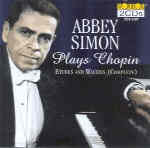Abbey Simon’s Chopin Études first came out on a budget-priced Turanbout LP in the late 1970s. It offered a viable alternative to more expensive editions from Ashkenazy (Decca) and Pollini (DG), and still does on CD. Simon takes more liberties with the text than his younger colleagues, often relaxing the line in order to emphasize a cadence or transition. He shifts voicing and dynamics to create novel yet convincing textural effects, such as Op. 10 No. 11’s rolled chords, Op. 10 No. 2’s accompaniment, Op. 10 No. 8’s left hand counterlines, and numerous imaginative touches throughout Op. 25. If anything, Simon’s ultra-secure technique sounds more sharply honed in the Waltzes, with his “old-school” outlook running at full, Josef Hofmann-esque tilt.
To be sure, a certain predictability seeps into Simon’s bag of interpretive tricks, like those sudden diminuendos on the first notes of phrases, or rubatos that stretch lyrical passages past the point of rhythmic recognition (as in the A minor, B minor, C-sharp minor, and A-flat “L’adieu” waltzes.) On the other hand, it’s marvelous to hear the E-flat Op. 18’s repeated notes dusted off to nonchalant perfection, and the E minor Waltz dash from the starting gate like a bat out of you know where. Keep Abbey Simon’s Waltzes handy for momentary jollies, but savor Rubinstein’s more direct, unaffected artistry for lasting value. His Études nicely supplement Ashkenazy, Pollini, and my favorite among modern versions, Juana Zayas (Music and Arts). By the way, there’s more to Simon’s juicy, colorful tone than you can glean from Vox’s drab, chrome-plated engineering.
































